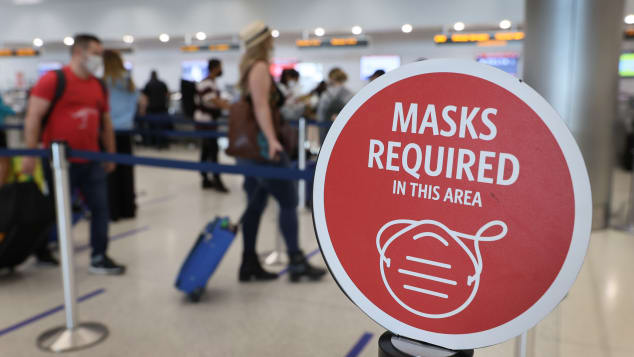(CNN) — With vacation travel reverting to pre-pandemic levels, a health expert offers advice for those planning to visit loved ones at Christmas, given the rise in COVID-19 cases in many parts of the country.
Both New York state and Washington reported record numbers of infection on Thursday.
Given the difficulty of finding tests to take home and the demand for tests that creates long lines across the country, other safety measures such as the use of N95 or KN95 masks while traveling for the holidays will be essential, said Dr. Esther Choo, an associate professor at Oregon Health and Science University.
Flying is at higher risk due to the lack of vaccine requirements and inconsistent adherence by some to fully maintain their masks, so “this could be a much safer activity than it is currently,” he said. Choo to CNN’s Laura Coates on Thursday.
“Report when you see that those around you are not wearing masks. This is not the time to be polite and let people do what they want. It’s really about keeping everyone safe,” he said.
Vaccines and booster doses have proven to be the best method of preventing serious illness, but immune systems take time to respond to the doses given. And people who aren’t vaccinated, whether they see other people for the holidays or not, are at a substantially higher risk of serious illness from COVID-19.
About 71 million people age 5 and older in the U.S. have yet to receive any doses of the vaccine, according to data from the U.S. Centers for Disease Control and Prevention (CDC).
More than 500 million doses of the covid-19 vaccine were administered in the United States, according to CDC data. Almost 62% of Americans are fully vaccinated, and more than 34% of fully vaccinated adults received a booster.
Difficulties to travel are expected
At least 2.08 million travelers were screened at U.S. airports on Wednesday, up from the same day of the week in 2019, according to the Transportation Security Administration. The agency forecasts that 20 million people will fly between December 23 and January 3, rivaling the 2019 figures.
However, multiple airlines recently announced flight cancellations and schedule changes due to crew members exposed to the omicron variant.
United Airlines canceled 169 flights on Christmas Eve, or 9% of its total number of flights, according to flight tracking site FlightAware as of this Friday morning.
“The increase in omicron cases across the country this week had a direct impact on our flight crews and the people who run our operation,” read a United note obtained by CNN.
Delta Air Lines canceled 118 flights on Christmas Eve, according to FlightAware, about 5% of its total schedule.
“Delta teams exhausted all options and resources, including route changes and aircraft and crew substitutions to cover scheduled flights,” the airline said in a statement.
Alaska Airlines announced that it canceled 17 flights Thursday because of omicron and there may be more cancellations on Christmas Eve.
But the covid-19 is not only affecting trips to the airport. A Royal Caribbean cruise ship was recently denied entry to Aruba and Curaçao after 55 fully vaccinated crew members and passengers (just over 1% of those on board) tested positive for covid-19 , the company reported to CNN.
The Odyssey of the Seas has no more scheduled ports of call and will have days at sea until its regular return scheduled for Dec. 26, Royal Caribbean said.
Researchers Show Braces and Masks Work
In a new article published Thursday in the journal Science, two infectious disease experts recommend more booster shots and more use of masks to protect people.
The vaccine’s effectiveness decreases over time, according to the researchers, but can be restored with a booster dose to help protect against last-minute infections.
“Time appears to be the key factor in reducing efficacy after vaccination,” write Ravindra Gupta, University of Cambridge (UK), and Dr. Eric Topol, Scripps Research Translational Institute (California).
“The continuity of transmission in heavily vaccinated populations underscores the need to scale-up vaccination across all age groups, while maintaining non-pharmacological interventions, such as the use of masks,” they write.
The researchers note that early in the vaccine rollout, countries that spaced the administration of the first and second doses of the Pfizer / BioNTech and Moderna mRNA vaccines saw greater durability of injection immunity, compared to with countries like the United States and Israel, where the doses of the vaccine were administered with an interval of three to four weeks.
“Administration of two doses of mRNA vaccine, 3-4 weeks apart, may have acted as a primary immunization, maximally inducing neutralizing antibodies but compromising long-lasting immunity,” the paper notes. This suggests that the two doses of the vaccine together likely acted as primary immunizations, rather than the first dose alone being the primary as intended.
And while Israel has started supplying a fourth dose of the COVID-19 vaccine to older people, Moderna’s chief medical officer, Paul Burton, said more time is needed in the US to determine the decline in immunity.
“We’re still going to have to wait a couple of months, until we can see how that data develops and matures to understand when that extra booster dose will have to be given, if one is needed,” Burton told CNN’s Wolf Blitzer. Thursday, adding that he didn’t want to downplay the reinforcements at this point.
“I think we can be sure, Wolf, that getting a booster shot will provide protection during the holiday season and during these winter months,” he said.
As for the specific reinforcement of a variant that Moderna is developing, Burton confirmed that the company will begin clinical trials in early 2022, although the continued presence of two different variants may disrupt plans.
CNN’s Jacqueline Howard, Deidre McPhillips, Amanda Sealy, Michael Nedelman, Pete Muntean, Sharif Paget, and Andy Rose contributed to this report.
–


